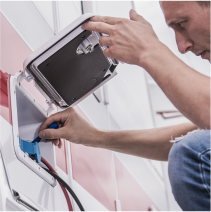Home > RV Dump Stations in Australia - Sanitary Dumps > RV Dump Stations in Northern Territory, Australia > RV Dump Stations Near Alice Springs, Northern Territory
Welcome to the beautiful and diverse Northern Territory of Australia, where the rugged Outback meets modern civilization. The Territory is known for its unparalleled natural beauty, rich indigenous history, and vibrant cultural heritage. Among its many attractions, the iconic Alice Springs stands out as a hub of tourism, trade, and adventure in the heart of the Territory.
Driving through the Northern Territory is an experience in itself, and requires some preparation and planning. The vast distances between towns and settlements, combined with the extreme weather conditions, can make for challenging but rewarding journeys. Be sure to pack plenty of water, food, and fuel, and use caution when driving, especially during the hot and dry season.
Along your way, you'll find many convenient and well-maintained RV dump stations, where you can safely and responsibly dispose of your waste. These stations are essential for protecting the fragile environment and ensuring the safety and health of the local communities. Whether you're traveling in a mobile home or a caravan, you'll find plenty of options for dumping your tanks and refueling your water supply.
In our listing directory of RV dump stations, you'll find all the information you need to plan your trip and make the most of your time in Alice Springs and the Northern Territory. From location details and driving directions to user reviews and ratings, we've got you covered. So come and explore the wonders of the Territory, while keeping it clean and green with our trusted RV dump stations.

You can find a list of RV dump stations in Alice Springs on our website, providing location details, driving directions, and user reviews to help you find the most convenient option.
Alice Springs is surrounded by stunning natural attractions like Uluru and Kings Canyon. Our listing directory can help you find RV dump stations near these sites, ensuring a hassle-free waste disposal experience.
When using an RV dump station, make sure to follow the provided instructions for dumping your tanks. Be mindful of the environment and local regulations by using only designated areas for waste disposal.
Yes, many RV dump stations in Alice Springs offer water refill services, allowing you to replenish your water supply while taking care of waste disposal.
Alice Springs experiences extreme weather conditions, particularly during the hot and dry season. It's important to plan your waste dumping accordingly, ensuring you have enough supplies and take caution when driving in challenging conditions.
Local regulations may vary, but it's generally important to dispose of waste only at designated RV dump stations and follow any specific instructions provided at each location to protect the environment and local communities.
Absolutely! Our listing directory includes RV dump stations not only in Alice Springs but also throughout the Northern Territory, making it easier for you to find convenient waste disposal options during your travels.
RV dump stations play a crucial role in protecting the fragile environment of the Northern Territory by providing a responsible and safe way to dispose of waste. By utilizing these stations, you help maintain the cleanliness and sustainability of the region.
